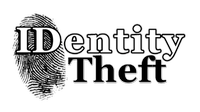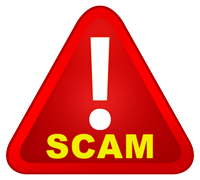Identity Theft
 What is Identity theft?
What is Identity theft?
Identity theft occurs when someone uses your name, address, Social Security number (SSN), bank or credit card account numbers, passwords, or other personal information without your knowledge to commit fraud or other crimes. While on-line banking and e-commerce are very safe with built-in security features for your protection, to avoid identity theft you should always be careful about responding to unsolicited requests for your personal financial information via the Internet, email, phone or mail.
Be Informed. Don't get "Phished".
One of the most common forms of stealing your banking account information is through a process called "Phishing". This is a scam that uses email to deceive you into disclosing personal information.
 How to spot Phishing.
How to spot Phishing.
It's easy to spot a scam... if you know what to look for
The email and linking Website may appear authentic. It may look just like your bank's Websit
It may ask you to "update" or "validate" your account information
Your Bank will never ask for private information by email or unsecured Website.
Often it will threaten some consequence if you don't respond.
These are clear indicators that someone is "Phishing" for your information.
Steps to avoid being Phished.
If you receive a suspicious email from your bank requesting personal information such as Social Security number, bank and credit card numbers, user names and passwords, follow these important guidelines:
Do not reply to the email, even if it appears urgent.
Do not use the links from the email to open any Web page.
Alert your bank immediately. Don't call any phone numbers appearing on the email.
Even though the laws are on your side, it's wise to take an active role in protecting your information.
If you think you've been Phished, here's what to do now:
Contact your Bank immediately.
Place a fraud alert on your credit report with the three major credit bureaus. Also request to review your credit reports for suspicious activity at that time.
Equifax: 1-888-766-0008
Experian: 1-888-397-3742
Trans Union: 1-800-680-7289
Close the accounts that you know or believe have been tampered with or opened fraudulently.
File a complaint with the Federal Trade Commission (http://www.consumer.gov/idtheft/).
File a report with local police.
To find an updated list of E-Scams
Go to www.fbi.gov/scams-safety/e-scams there you will find an up to date list of computer scams and malware.To make a report if you believe you have received an E-Scam go to the Internet Crime Complaint Center ( www.ic3.gov ) and file a report.
Online Safety Tips
To minimize your risk of identity theft do not share your , address, Social Security number (SSN), bank or credit card account numbers, passwords, or other personal information unless you know the recipient is a trusted source. Know who you are dealing with.
Before you accept any offers online read the fine print. If necessary ask for more information from the company, a legitimate company will provide the information you requested a scammer will not.
Use anti-spyware and anti-virus software. Utilize software with a firewall and ensure it is turned on and set up properly. An anti-virus software should remove or quarantine viruses and anti-spyware should undo changes the software makes to your system.
Ensure your web browser security settings are high enough to reduce the risk of being hacked and regularly update your browser with the latest updates.
Protect your passwords. Do not share them over the internet, email or phone.
US Mail
It has become more common for people to receive a letter from a “sweepstakes” or from a business stating they have won a large sum of money or a prize.
Typically you will be asked to send a several hundred dollars or even up to a thousand dollars depending on the prize amount. This money will be to cover taxes, fees, or shipping. You will usually be asked to send a money order. In some cases a check will be sent with the letter which appears legitimate; however once you deposit the check in your bank account and wire the money back the check turns out to be fake. You will now be responsible for the lost money.
Tips to Identify a Scam
Never give personal information, such as your social security number or bank account number, to someone you don’t know who calls you or sends you an email or letter.
Never agree to wire or send money to claim a prize. It’s illegal to require an upfront fee for a prize.
If you did not enter a contest, it’s probably a scam.
If you do not know the source of a check do not deposit the check into the bank. You could be responsible for any loss if the check is fake.
You can report these type of scams to the Kansas Attorney General’s Office by calling the Consumer Hotline at 1‑800‑432‑2310 or visiting their web site at www.ag.ks.gov.



